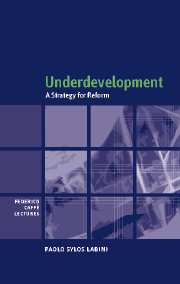Book contents
- Frontmatter
- Contents
- List of figures and tables
- Introduction
- 1 Economic development in a secular perspective
- 2 Culture, institutions and resources
- 3 The inadequacy of mainstream economics to explain development processes: returns and prices
- 4 The inadequacy of mainstream economics to explain development processes: distribution and growth
- 5 Economic relations between developed and underdeveloped countries
- 6 Demographic pressure and the countries of increasing poverty
- 7 Dependent workers, employment and unemployment
- 8 Organizational and institutional innovations
- 9 The problem of corruption
- Conclusion: a strategy for reform
- Bibliography
- Index
5 - Economic relations between developed and underdeveloped countries
Published online by Cambridge University Press: 22 September 2009
- Frontmatter
- Contents
- List of figures and tables
- Introduction
- 1 Economic development in a secular perspective
- 2 Culture, institutions and resources
- 3 The inadequacy of mainstream economics to explain development processes: returns and prices
- 4 The inadequacy of mainstream economics to explain development processes: distribution and growth
- 5 Economic relations between developed and underdeveloped countries
- 6 Demographic pressure and the countries of increasing poverty
- 7 Dependent workers, employment and unemployment
- 8 Organizational and institutional innovations
- 9 The problem of corruption
- Conclusion: a strategy for reform
- Bibliography
- Index
Summary
Innovations and the great sectors of the economy
Technical progress does not affect all economic activities with the same intensity. Some activities – the innovating ones – will be those imparting the strongest impulses to economic changes; others will profit from the innovations emerging in these activities; still others will decline or even disappear owing to competition from the new activities. Thus the increase of output as well as the changes in employment should be seen as the result of algebraic sums. The very structure of the economic system undergoes, almost without interruption, changes and readaptations, that appear evident when considering not only individual firms, but also whole sectors, such as agriculture, industry and services. In advanced countries, the agricultural sector has undergone deep changes: output has increased, in spite of the fact that employment has declined in both relative and absolute terms. In developed countries, this decline has seldom been the consequence of expulsion of workers decided by landowners or by managers; more often, it has been the result of decisions of workers leaving agriculture attracted by the towns in the conviction that such a move could improve their lot, at least in theory. Emigration from agriculture imparted an upward push to agricultural wages, thus contributing to determining in agriculture the Ricardo effect – dynamic substitution of machines for labour.
- Type
- Chapter
- Information
- UnderdevelopmentA Strategy for Reform, pp. 96 - 118Publisher: Cambridge University PressPrint publication year: 2001



